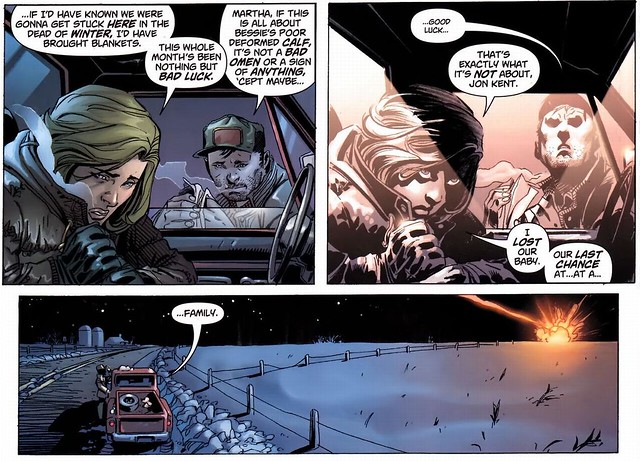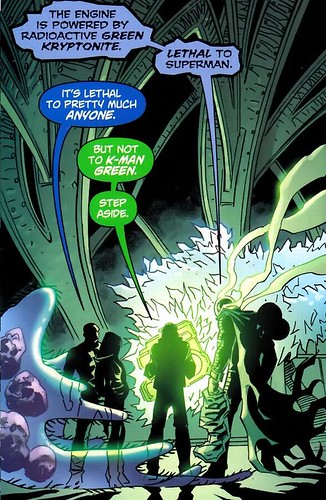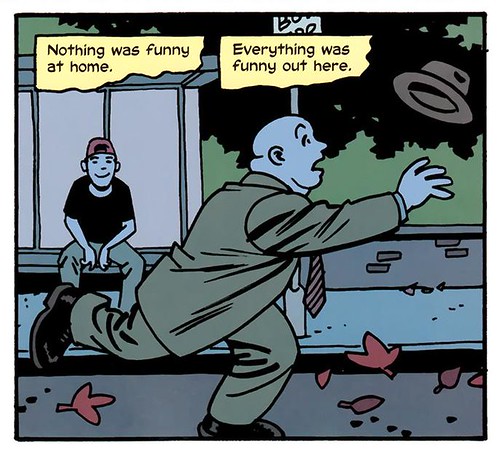
Hello hello! Friday's post on Morrison and Kubert's Action Comics #5 got our critics typing furiously -- so furiously, in the case of Scott Cederlund, that he was so spent after writing his contribution that he forgot to actually send it to your humble editor. So, with no further ado, because as Stan always noted, we've run all out of ado -- here's Scott's take on Action Comics #5.
Grant Morrison has already done the near-perfect version Superman’s origin story in All-Star Superman #1:
“Doomed planet.
“Desperate Scientists.
“Last Hope.
“Kindly Couple”
For the story we’ve no doubt seen countless times, Morrison and Frank Quitely reduced it down to eight words and four pictures. It reminded us of everything we needed to know about Superman. It’s not tied into any particular continuity or story but it’s so simple that it’s about all Superman stories. In that way, it made All-Star Superman a universal story. Anyone who knows anything about Superman could pick up that book and not have to worry about whether they were reading the Golden Age Superman, John Byrne’s reboot, Waid’s version of the story or Geoff Johns’s most recent retelling. Morrison created the platonic ideal of a “baby is sent away from an exploding planet to be found and raised by a farming couple.” Action Comics #5 does in 28 pages what Morrison slyly did in four panels.
 The problem is that those four panels are expanded to the story beats in Action Comics #5 and they don’t even come together as a story. Slotted-in between the main story in issues #4 and #7, Action Comics #5 has the stink of an old-fashioned fill-in issue, complete with a story that has tangential ties to the rest of the series and a different artist. Morrison shows us these moments on Krypton and on earth that we’ve seen countless times without adding anything substantial to it. The costumes and the rocket look different. The Kent’s child-bearing problems are a bit more realistic and emotional but in a sense they were always implied. And in the end, mysterious, shadowy characters show up to tease us about future plot points.
The problem is that those four panels are expanded to the story beats in Action Comics #5 and they don’t even come together as a story. Slotted-in between the main story in issues #4 and #7, Action Comics #5 has the stink of an old-fashioned fill-in issue, complete with a story that has tangential ties to the rest of the series and a different artist. Morrison shows us these moments on Krypton and on earth that we’ve seen countless times without adding anything substantial to it. The costumes and the rocket look different. The Kent’s child-bearing problems are a bit more realistic and emotional but in a sense they were always implied. And in the end, mysterious, shadowy characters show up to tease us about future plot points. In his book Supergods, Morrison describes Siegel and Shuster’s Superman as a socialistic hero a man trying to bring down the corrupt businesses of the late 1930s. He’s a hero of the people who isn’t actually of the people himself. He’s the perpetual outsider who’s strongest wish is to have the American dream life everyone wishes for. In Action Comics, Morrison has tried to recreate that version of Superman. This isn’t the Silver Age hero that he paid homage to in All-Star Superman and this isn’t any Superman we’ve seen in the last 40 years. This is a Superman who is going to be an American hero because he’s going to fight for the American people.
That’s where Morrison’s story started. Not with Brainiac and cities being stolen. Not with exploding planets and doomed races. Action Comics #1 started with Superman trying to force a confession out of a corrupt businessman. That doesn’t sound very super but I think Morrison knows that his Clark Kent isn’t Superman yet. Anyone can wear a t-shirt with the S-shield on it. I do it all the time. Morrison’s Superman is a primitive proto-hero and that’s the story that Morrison should be telling. Everything he’s done in the last three issues feel like Superman stories we’ve read countless times by Mort Weisinger, Curt Swan, John Byrne and Dan Jurgens.
 In this last few years of political, economic and social upheaval in the United States, I think Morrison is on the right track in trying to redefine Superman. The 21st Century started out with a Superman that somehow tried to renounce any American citizenship and even was proclaimed as standing for “truth, justice and all of that other stuff.” But like the times when Superman was created, the “American way” is either corny, an anachronism or a lie depending on your views of the country. And how does the country’s #1 adopted son respond to that? That’s the story that it felt like Morrison was trying to tell in the first two issues of Action. How does the ultimate boy scout live in an era where the Boy Scouts are eventually sent overseas to fight wars that no one understands while those who stay home get rich and fat?
In this last few years of political, economic and social upheaval in the United States, I think Morrison is on the right track in trying to redefine Superman. The 21st Century started out with a Superman that somehow tried to renounce any American citizenship and even was proclaimed as standing for “truth, justice and all of that other stuff.” But like the times when Superman was created, the “American way” is either corny, an anachronism or a lie depending on your views of the country. And how does the country’s #1 adopted son respond to that? That’s the story that it felt like Morrison was trying to tell in the first two issues of Action. How does the ultimate boy scout live in an era where the Boy Scouts are eventually sent overseas to fight wars that no one understands while those who stay home get rich and fat? After only a couple issues of a 21st century Superman, Morrison falls back on retelling the stories we already know with Krypton and Kansas and Lex Luthor and Brainiac. Maybe that’s the new DC, the illusion of change and progress as the stories end up recycling everything we’ve seen before. We expect more out of Morrison though, don’t we? We expect to see some reinvention of these stories and these concepts but any changes in Action Comics #5 to the familiar origin are purely cosmetic and don’t add anything to the story that he has been telling. DC has become the masters of illusion with this revamp but it’s a thin illusion. Maybe if Morrison had shown us something we hadn’t seen before this issue would feel more significant but like the rest of Morrison’s Action run so far, it’s full of ideas and concepts that feel like they want to find a story to be a part of.
Buy Action Comics Vol. 1: Superman and the Men of Steel from Amazon.com.




